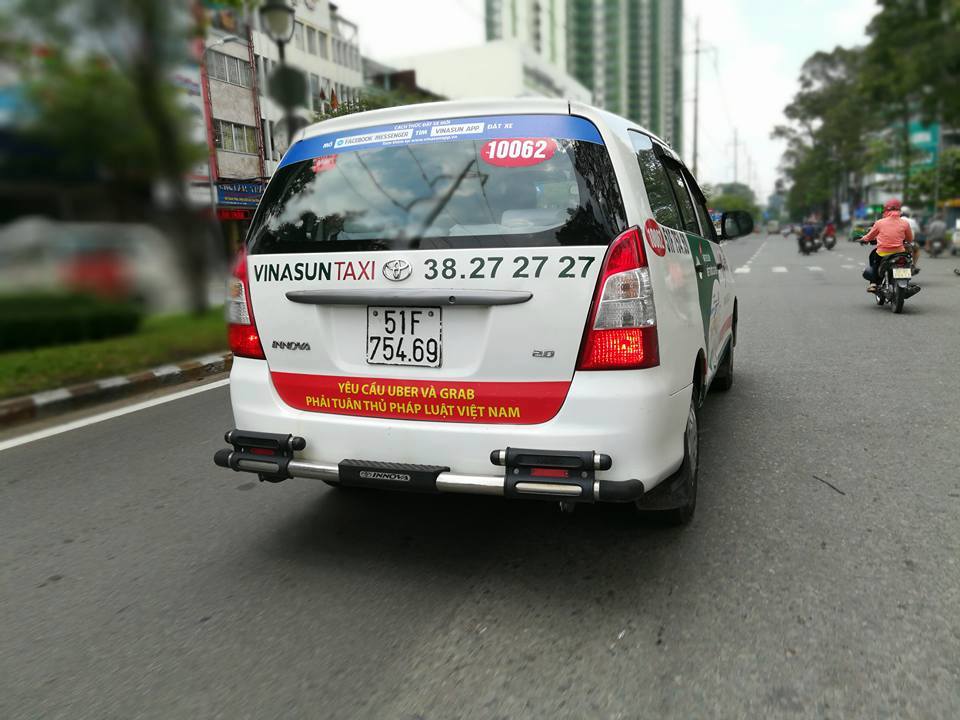Vinasun’s anti-Uber and Grab banners backfire
 |
| Vinasun and other traditional taxi companies' banners may be a violation of domestic competition law |
According to lawyer Nguyen Van Hau, chairman of the Vietnam Lawyers' Commercial Arbitration Centre, Vinasun and other traditional taxi firms’ affixing banners on their cabs to protest ride-hailing firms are in violation of domestic competition law. Specifically, the act may constitute libel or defamation.
According to Article 43 of the Law on Competition, enterprises are prohibited from defaming or libeling another enterprise by direct or indirect acts providing untruthful information which adversely impact the reputation, financial position or business activities of the other enterprise.
Therefore, the red banners on taxicabs calling on Uber and Grab to abide by Vietnamese laws have infringed the rules on fair competition.
He further noted that the government has not yet concluded whether Grab and Uber are liable to pay taxes in Vietnam. Thus, sticking protest banners sows misleading information among the public.
In addition, banners on cars are a form of advertisement, which needs to be approved by regulatory authorities.
Some industry insiders said that the incident was brought about by the stiff competition between traditional taxi firms and ride-hailing services like Grab and Uber. Traditional businesses have been battling several challenges which adversely impact their operations and growth.
A brand expert pointed out that local taxi firms need to overhaul their business amidst the rising competition. They need to expand investment and restructure their operations rather than defaming others, which does not reflect culture, heritage, and the positive image of the increasingly integrated Vietnam.
On the same note, Hau put the incident down to corporate governance problems. Vinasun is a popular listed company with a legal department, but still infringes competition law and has no plans to deal with the public relation crisis.
On the other hand, Ta Long Hy, deputy general director of Vinasun, pointed the accusing finger at drivers, saying they glued the protest banners on their cabs without consulting the company first.
Commenting on the incident, Bui Quang Tin, CEO of BizLight Business School, shared with Dan Tri that the intensifying competition can lead to infringements of domestic law as well as regulations of the free trade agreements that Vietnam is party to.
In the face of intensive pressure, especially ahead of the Industry 4.0, businesses should strengthen corporate governance, vision, and business development. They should team up to boost competitiveness as well as invest in human resources and technology to raise productivity and cut production costs.
Consumers prefer good services with a reasonable price and friendly staff. Local firms should alter their strategies to win customers, according to Tin.
However, it is the cab drivers who will suffer the most from this incident and Vinasun's business failure. The banners will likely damage Vinasun's reputation and might easily draw civil proceedings of libel and defamation in their wake, pushing Vinasun over the brink where the company's leadership mistakes brought it to. This might threaten the employment of 10,000 Vinasun cab drivers.
What the stars mean:
★ Poor ★ ★ Promising ★★★ Good ★★★★ Very good ★★★★★ Exceptional
Themes: Ride-hailing services
Latest News
More News
- Opella and Long Chau join forces to enhance digestive and bone health (February 06, 2026 | 18:00)
- Vietnam-South Africa strategic partnership boosts business links (February 06, 2026 | 13:28)
- Sun PhuQuoc Airways secures AJW Group support for fleet operations (February 06, 2026 | 13:23)
- Pegasus Tech Ventures steps up Vietnam focus (February 05, 2026 | 17:25)
- The generics industry: unlocking new growth drivers (February 04, 2026 | 17:39)
- Vietnam ready to increase purchases of US goods (February 04, 2026 | 15:55)
- Steel industry faces challenges in 2026 (February 03, 2026 | 17:20)
- State corporations poised to drive 2026 growth (February 03, 2026 | 13:58)
- Why high-tech talent will define Vietnam’s growth (February 02, 2026 | 10:47)
- FMCG resilience amid varying storms (February 02, 2026 | 10:00)














 Mobile Version
Mobile Version